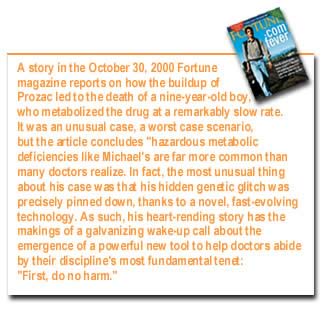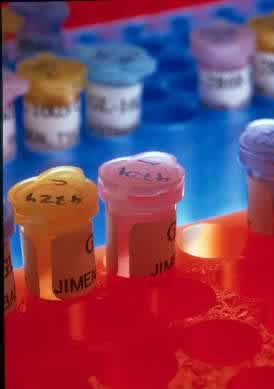|
Pharmacogenetic Testing -
Prescription Drug Reaction Tests Now Available
Do not alter the dosage amount
or schedule of any drug you are taking without first consulting
your doctor or pharmacist.
Research shows that of all the clinical factors such as age,
sex, weight, general health and liver function that alter a patient's
response to drugs, genetic factors are the most important. This
information becomes even more crucial when you consider the fact
that adverse reactions to prescription drugs are killing about
106,000 Americans each year -- roughly three times as many as
are killed by automobiles. This makes prescription drugs the fourth
leading killer in the U.S., after heart disease, cancer, and stroke.
We currently offer CYP2D6, CYP2C9, and CYP2C19 screens that can
help your physician or druggist predict your particular response
to more than a quarter of all prescription drugs. These include
such important medications as Coumadin (Warfarin), Prozac, Zoloft,
Paxil, Effexor, Hydrocodone, Amitriptyline, Claritin, Cyclobenzaprine,
Haldol, Metoprolol, Rythmol, Tagamet, Tamoxifen, Valium, Carisoprodol,
Diazepam, Dilantin, Premarin, and Prevacid (and the over-the-counter
drugs, Allegra, Dytuss and Tusstat). Click
here to view a more complete list of drugs processed through these
pathways.
Approximately half of all Americans have genetic defects that
affect how they process these drugs. There are four different
types of metabolizers, and we all fall into one of these categories
for the variable pathways in Cytochrome P450 (this Cytochrome
is responsible for creating the enzymes that process chemicals
of all kinds through our bodies.) The easiest way to understand
this is to picture a two lane highway.
· If you are the first type which is the norm, you would
be an EXTENSIVE metabolizer. Both lanes of the highway are open
and moving. Medications prescribed in normal doses will be metabolized
by your body.
· If you are the second type, you would be an INTERMEDIATE
metabolizer. This means that one lane of that highway is open
and moving and the other lane is not, causing you to metabolize
the medications more slowly. In this case you will need a lower
dosage, and there is a chance of medications building up in your
system causing adverse effects. It is especially importnat to
monitor medications if you are in this category.
Intermediate metabolizers through the 2C9 pathway, for instance,
have an increased risk of bleeding incidences when taking the
common blood thinner Coumadin or Warfarin. For this reason, a
recent article in the Journal
of the American Medical Association reccomends screening for
CYP2C9 variants to reduce the risk of adverse drug reactions in
these patients.
· The third type is a POOR metabolizer. In this case both
lanes of the highway would be stopped. There is a possiblility
that alternate routes can be found, but this type of metabolizer
is potentially very dangerous, as there is a great chance for
the medication to build up in your system making you very sick,
or even killing you.
For example, a poor metabolizer of Phenytoin, a common antiepileptic
would not be able to process the drug and would actually have
an increased rather than decreased risk of seizure if prescribed
this drug.
· The fourth type of metabolizer is ULTRA EXTENSIVE. This
means you have additional lanes for processing, picture an Indy
500 speedway. In this instance, you literally burn through medications.
If you were an Ultra extensive metabolizer through the 2D6 pathway
and while in surgery and your doctor gave you codeine as a pain
killer, you would receive no pain relief because the codeine would
be metabolized so fast that it would have little or no effect
on you.
The Testing Process
The process is simple. We send you a blood collection kit in
the mail. You can either make an appointment with your doctor
or we will provide you with the contact information for a phlebotomist
in your area. Blood samples are overnighted to our laboratory
and results are typically available in 15 business days.
Currently Available Tests
CYP2D6 (cytochrome P450 2D6) is
the best studied of the DMEs and acts on one-fourth of all prescription
drugs, including the selective serotonin reuptake inhibitors (SSRI),
tricylic antidepressants (TCA), betablockers such as Inderal and
the Type 1A antiarrhythmics. Approximately 10% of the population
has a slow acting form of this enzyme and 7% a super-fast acting
form. Thirty-five percent are carriers of a non-functional 2D6
allele, especially elevating the risk of ADRs when these individuals
are taking multiple drugs. Drugs that CYP2D6 metabolizes include
Prozac, Zoloft, Paxil, Effexor, Hydrocodone, Amitriptyline, Claritin,
Cyclobenzaprine, Haldol, Metoprolol, Rythmol, Tagamet, Tamoxifen,
and the over-the-counter diphenylhydramine drugs, Allegra, Dytuss,
and Tusstat. CYP2D6 is responsible for activating the pro-drug
codeine into its active form and the drug is therefore inactive
in CYP2D6 slow metabolizers.
CYP2C9 (cytochrome P450 2C9) is
the primary route of metabolism for Coumadin (Warfarin). Approximately
10% of the population are carriers of at least one allele for
the slow-metabolizing form of CYP2C9 and may be treatable with
50% of the dose at which normal metabolizers are treated. Other
drugs metabolized by CYP2C9 include Amaryl, Isoniazid, Sulfa,
Ibuprofen, Amitriptyline, Dilantin, Hyzaar, THC (tetrahydrocannabinol),
Naproxen, and Viagra.
CYP2C19 (cytochrome P450 2C19) is
associated with the metabolism of Carisoprodol, Diazepam, Dilantin,
Premarin, and Prevacid.
Other tests we are planning to provide include:
NAT2 (N-acetyltransferase 2) is
a second-step DME that acts on Isoniazid, Procainamide, and Azulfidine.
The frequency of the NAT2 "slow acetylator" in various
worldwide populations ranges from 10% to more than 90%.
The advantages of Genelex's consumer genetic testing include:
· Safety. Decrease the chance that you will be the victim
of an adverse drug reaction. More than 100,000 hospitalized Americans
die of adverse drug reactions and two million outpatients have
serious episodes each year. Knowledge of your DNA Drug Reaction
Profile may help your physician or druggist prevent this from
happening.
· Efficacy. Prescription drugs on the market today are
usually prescribed by trial and error because they have been tested
and approved in a "one size fits all" fashion. If you
eliminate a particular drug more rapidly than the norm, taking
the normal dose may be a complete waste of time. The drug simply
will not work as prescribed, and it may take a while to discover
this.
· Responsibility. Play a more active role in your health,
your family's health, and in healthcare at large. DNA testing
for drug reactions is just coming onto the market and you, the
consumer, can help all of us take this major step toward better
medicine.
Check Common Drugs Processed
by Enzymes We Test
Order DNA Prescription
Drug Reaction Profile

Michael's tragedy could have easily been avoided had he been
tested beforehand to see which variants of the CYP2D6 gene he
carried. The DNA Prescription Drug Reaction Profile offered by
Genelex tests this drug metabolizing enzyme.
|





